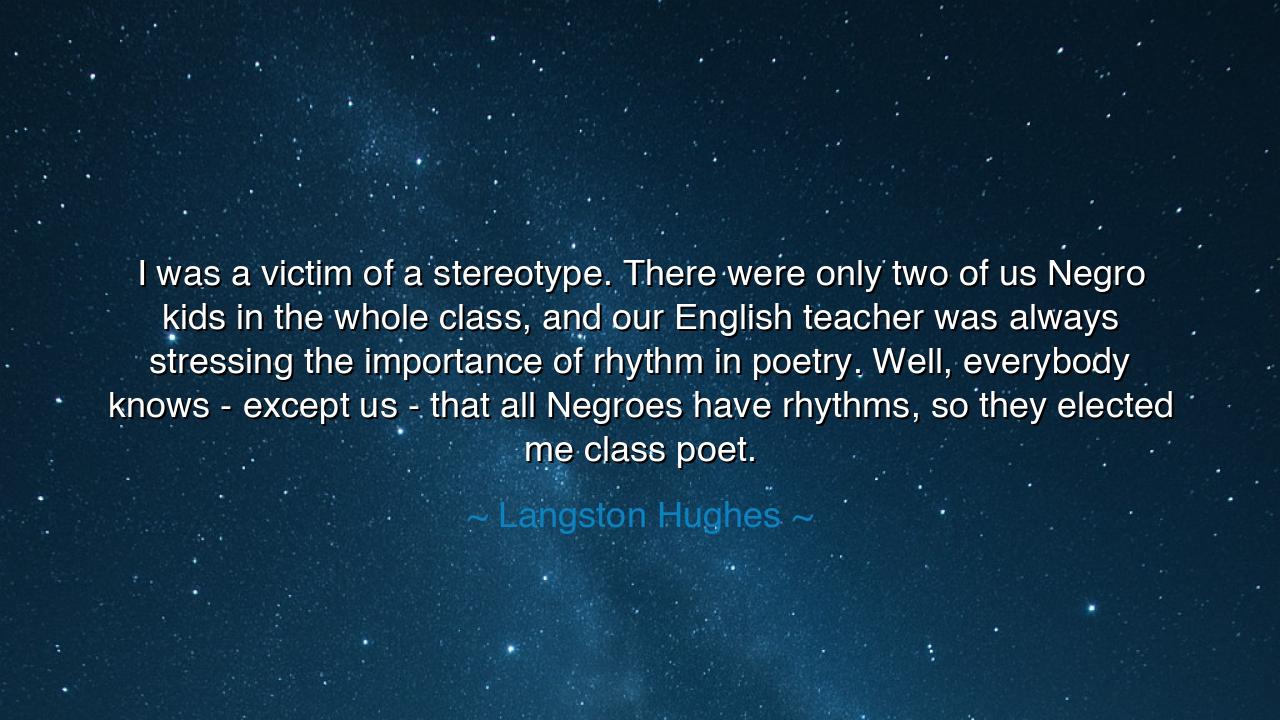
I was a victim of a stereotype. There were only two of us Negro
I was a victim of a stereotype. There were only two of us Negro kids in the whole class, and our English teacher was always stressing the importance of rhythm in poetry. Well, everybody knows - except us - that all Negroes have rhythms, so they elected me class poet.






Langston Hughes, the great voice of the Harlem Renaissance, once reflected on the strange beginnings of his calling: “I was a victim of a stereotype. There were only two of us Negro kids in the whole class, and our English teacher was always stressing the importance of rhythm in poetry. Well, everybody knows — except us — that all Negroes have rhythm, so they elected me class poet.” His words carry both humor and pain, both irony and truth. In them is the story of how society’s narrow view of race shaped his path, and yet how he transformed that limitation into a gift that would thunder across generations.
The origin of this quote lies in Hughes’ youth, when he was first recognized — not for his skill, but for a caricature. His classmates, guided by their own assumptions, imagined that because he was Black, he must carry rhythm within him. And so, without his consent, they named him a poet. Yet what was meant as a stereotype became a prophecy. Hughes embraced the role and poured into it the true rhythm of his people: the blues, the sorrow songs, the laughter, the defiance. Thus, from the soil of prejudice, there bloomed a voice that would not be silenced.
History is full of such ironies. Consider Frederick Douglass, born into the chains of slavery, denied the right to read and write. The stereotype of his age declared that the enslaved were incapable of learning. Yet Douglass shattered that lie, teaching himself to read, becoming one of the greatest orators and writers of the nineteenth century. What was meant to hold him down became the very ground from which he rose. Hughes’ story belongs to the same lineage: the stereotype did not crush him; he transformed it into art, into truth, into power.
The deeper meaning of Hughes’ reflection is that identity must not be handed down by others. He was named poet for the wrong reasons, yet he became one for the right ones. His work was not the product of a stereotype, but of genius, struggle, and the lived experiences of Black America. In this, Hughes teaches us that while society may try to define us with shallow assumptions, it is within our own hearts to take what is given and reshape it into destiny. What was born in misunderstanding became, through his labor, a voice that captured the soul of a people.
Yet his words also carry a warning: that stereotypes, even when playful or seemingly harmless, carry weight. They shape opportunities, they assign roles, they box people into cages. For every Hughes who turned stereotype into greatness, there are countless others whose talents were ignored because they did not fit the mold imposed upon them. The irony of his story is sharpened by this reality: he became a poet not because his gifts were seen, but because a myth about his race was projected onto him.
The lesson for us is both sobering and inspiring. Sobering, because we must never allow stereotypes to determine the worth or destiny of another. Inspiring, because we see in Hughes the possibility of transformation — that even when others misjudge us, we may still forge beauty from it. The true victory lies not in the stereotype itself, but in the ability to transcend it, to reclaim the label and fill it with truth instead of falsehood.
What must you do, then? First, guard against the casual use of assumptions, for they wound deeper than they seem. Second, if you are marked by the world with a false label, do not let it define you — reshape it, as Hughes did, into a badge of power. Third, honor the voices, like Hughes’, who turned pain into poetry, who took the imposed rhythm and made it sing with authenticity.
Thus let Langston Hughes’ words echo not only as irony, but as triumph: “I was a victim of a stereotype … so they elected me class poet.” What began in ignorance became a voice of fire, of rhythm, of beauty, a voice that still sings today. Learn from his story: though the world may name you falsely, it cannot determine the truth of your soul unless you let it. And when you speak in your true voice, as Hughes did, your song may outlive the generations that once misunderstood you.






AAdministratorAdministrator
Welcome, honored guests. Please leave a comment, we will respond soon